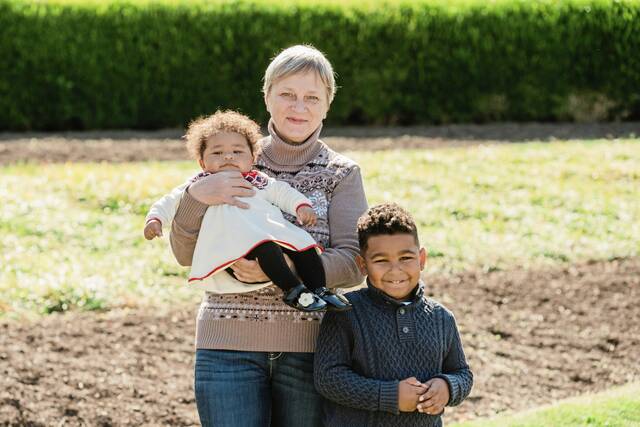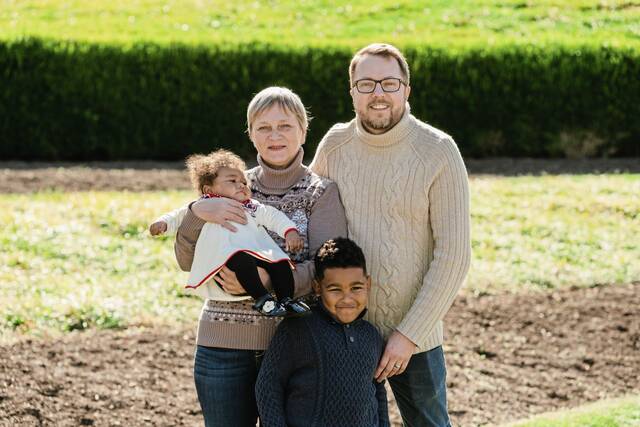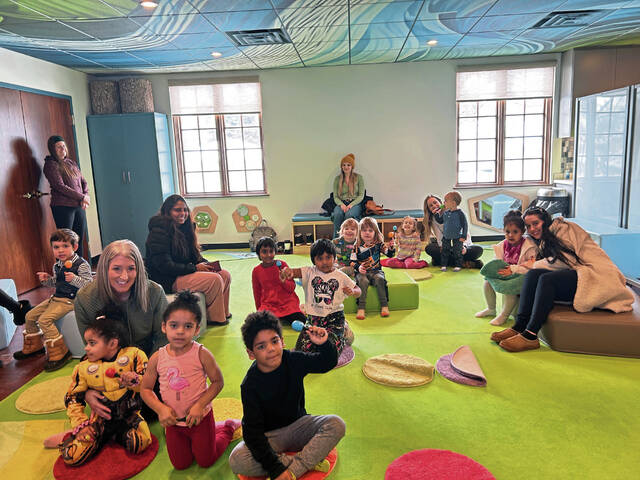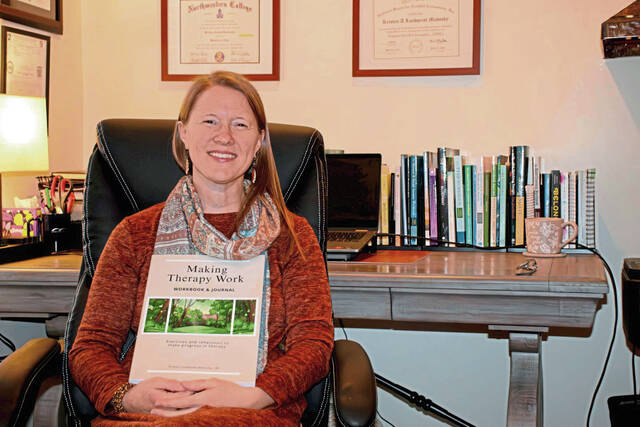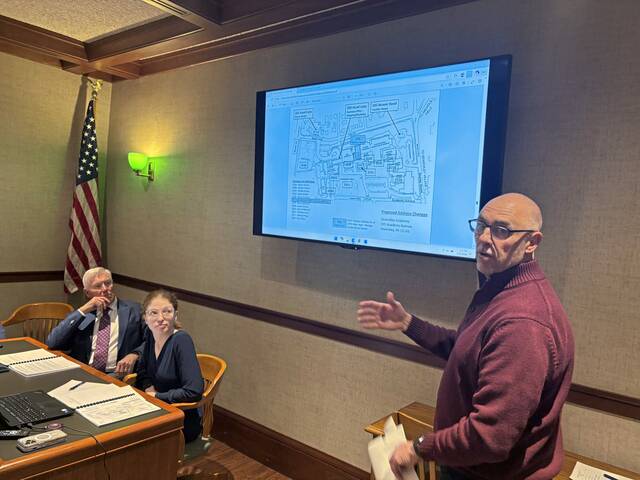Nadiia Koshykova packed light on Dec. 12, 2021, when she traveled by rail, then by plane, from her native Ukraine to visit her son’s family in their Ohio Township home.
“I have one suitcase — winter clothes,” Koshykova, 66, said. “I wanted to see America and then return back to Ukraine.”
Fate had other things in mind for Nadiia Koshykova.
For nearly the next four years, though, Koshykova learned how to roll with the unplanned and the unexpected. The environmental scientist and grandmother of two started planting new roots in Pennsylvania after war broke out in Ukraine. Then, once those roots had taken hold, she again was displaced, this time, by a blaze that ravaged a three-story apartment building last month in Pittsburgh.
After the bloodiest conflict in Europe since World War II erupted in February 2022, opportunities quickly shrank for Koshykova to return from America to the home where she’d been born — Krivoy Rog, Ukraine, a city of 600,000 residents whose 18th-century founding as a military post changed once rich iron-ore deposits were discovered along area riverbeds.
Koshykova has continued paying rent online for her Krivoy Rog apartment: about 2,000 Ukrainian hryvnia monthly, which translates to roughly $50 or $60 in American cash.
But she has also set her sights forward. She traded in her son and his husband’s Sewickley mailing address for a Pittsburgh apartment.
Koshykova, who acquired a “green card,” also started working — most recently at a clothing store. She took Pittsburgh Regional Transit’s 61D or 64 buses several days a week from her new apartment in Squirrel Hill to her job at Marshall’s in The Waterfront development, just three miles away in Homestead.
Koshykova’s first three years as an immigrant in the U.S. revolved heavily around doting on her grandchildren: Vaughn, who’s almost 6 years old, and Ann, 18 months.
But other key details — such as pursuing U.S. citizenship and improving her English skills — got complicated last month. A Sept. 9 fire destroyed 30 apartments, including Koshykova’s, in a three-story building constructed a century ago on Forward Avenue.
She escaped with her immigration paperwork and little else.
“She came here in a bathrobe, with just some files in her purse,” said Ryan Scarola, 49, as he sat with Koshykova, his mother-in-law, in their home at the end of a small, winding cul-de-sac.
Koshykova says the sound of her apartment building’s smoke alarms is stuck in her head. She still gets spooked, even if momentarily, when the oven beeps in her son’s house, where she’s currently staying.
“These are the questions for me: why did it happen to me?” added Koshykova, who peppered conversation with bits of Russian, their resonant consonants and rolled Rs sounding lyrical, even musical. “I try to be kind. I try to be polite. I try to be honest with other people. Why did this happen to me?”
Despite the questions, Dmytro, or “Dima,” Scarola, 44, said his mother doesn’t perseverate on her bad luck — but Ukraine is a country steeped in superstition.
When Ukrainians forget something after leaving the house, they feel good luck requires them to look in a mirror before returning to their cars, Dmytro Scarola said.
The nation has some of the bad-luck standard-bearers — when you pass a black cat, for example, you must spit three times over your left shoulder, he said. But you also never borrow money in the evening. And Ukrainians say there are superstitious dangers in taking out the trash after sunset.
Koshykova said there are no superstitious rites planned for her next apartment, which she’s been rushing around Allegheny County — with a focus on Pittsburgh’s East End neighborhoods — to secure. Nearly 100 donors already have raised $7,300 through a GoFundMe campaign as of presstime on Sept. 25 to pay for furniture and everything needed to fill her new home.
Some things have surprised Koshykova, whose late husband was not around when she raised her only son in post-Soviet Ukraine.
“In the U.S.A., people are very polite,” she said. “In Ukraine, they’re sometimes rude, sometimes angry. That surprised me about America.”
Other details? Not so much.
Her hometown, like Pittsburgh, sits at the confluence of multiple rivers. Its name, Krivoy Rog, translates roughly to “crooked horn,” a reference to the path of its two rivers.
Her hometown, also like Pittsburgh, has written its history in steel. One company based there, ArcelorMittal Kryvyi Rih, produced nearly 2 million tons of steel last year — nearly the same amount as U.S. Steel’s Mon Valley Works, which includes the Edgar Thomson plant in Braddock.
Koshykova doesn’t attend services at Ukrainian houses of worship in nearby Carnegie — St. Peter and St. Paul, a Ukrainian Orthodox church, or Holy Trinity Church, a Byzantine Catholic one. She instead stays connected to Ukraine and its rhythms through her cellphone’s WhatsApp program.
When she needs a touch of home, Koshykova treks to the Kiev International Market in Pittsburgh’s Greenfield neighborhood, where she likes to buy herring and Ukrainian Zefir — a marshmallow-like confection made with fruit puree, sugar and egg whites.
“Everybody loves the dumplings there,” Dmytro Scarola chimed in.
Koshykova is far from alone.
The war had displaced more than 6.9 million Ukrainians — about 18% of the country’s population, as of February, a United Nations refugee agency reported. More than 1 million refugees from that group were reported in Poland, U.N. data shows. More than 1.2 million went to Germany.
Though Koshykova came to Pittsburgh thanks to a family reunification visa, around 240,000 Ukrainians have fled to the U.S. since 2022 through the government’s Uniting for Ukraine program. At one peak in the program’s first year, U.S. Customs and Border Protection reported encountering up to 1,300 Ukrainians each day.
It’s hard to say how many Ukrainian refugees landed in Pittsburgh, according to Ivonne Smith-Tapia, JFCS’ refugee and immigrant services director.
The program Smith-Tapia leads supported more than 1,100 community members last year, but JFCS officials could not provide a breakdown based on nationality.
About 75,000 Allegheny County residents — about 6% of the county’s population — are foreign-born, U.S. Census data shows. The number in Westmoreland County is around 6,000 — less than 2% of the population there.
Those numbers include naturalized citizens, legal permanent residents, temporary migrants such as foreign students, and undocumented migrants.
They also include refugees from the Congo, Haiti, Iraq, Nicaragua and Syria, county officials said. The Bhutanese community — the area’s largest refugee group — is concentrated along the Route 51 corridor in Mt. Oliver, Brentwood, Baldwin, Whitehall and Pittsburgh neighborhoods like Carrick.
“Many of these communities, they’re in limbo,” Smith-Tapia, the JFCS administrator, told TribLive. “Our work is impacted greatly by what is happening locally, but also by what’s happening at the national and international levels.
“People migrate on their own — for one reason or another, they arrive in Pittsburgh,” she added. “And we respond to that.”
Koshykova sees similarities between the tragedies that have defined her extended stay here — the war in Ukraine and the Squirrel Hill fire.
“I escaped the war — and I escaped the fire,” she said empathically.
“The keyword is ‘escape,’” her son interjected. “Because sometimes you don’t escape.”
Koshykova said the fire has also helped change her feelings about repeated displacement.
“After the fire, first I was shocked. Now, I feel sad,” she said, mourning the loss of family photos and other irreplaceable keepsakes. “But my family, my co-workers, my manager, they help support me. And I’m so grateful for all the people who have supported me.”


